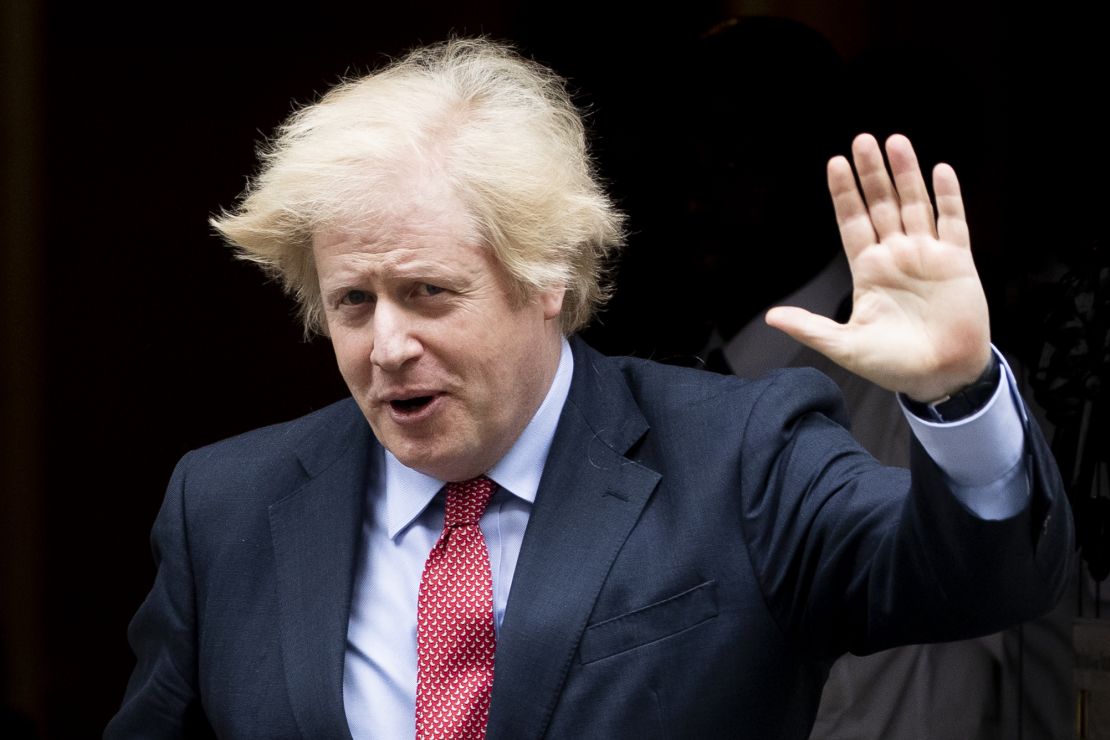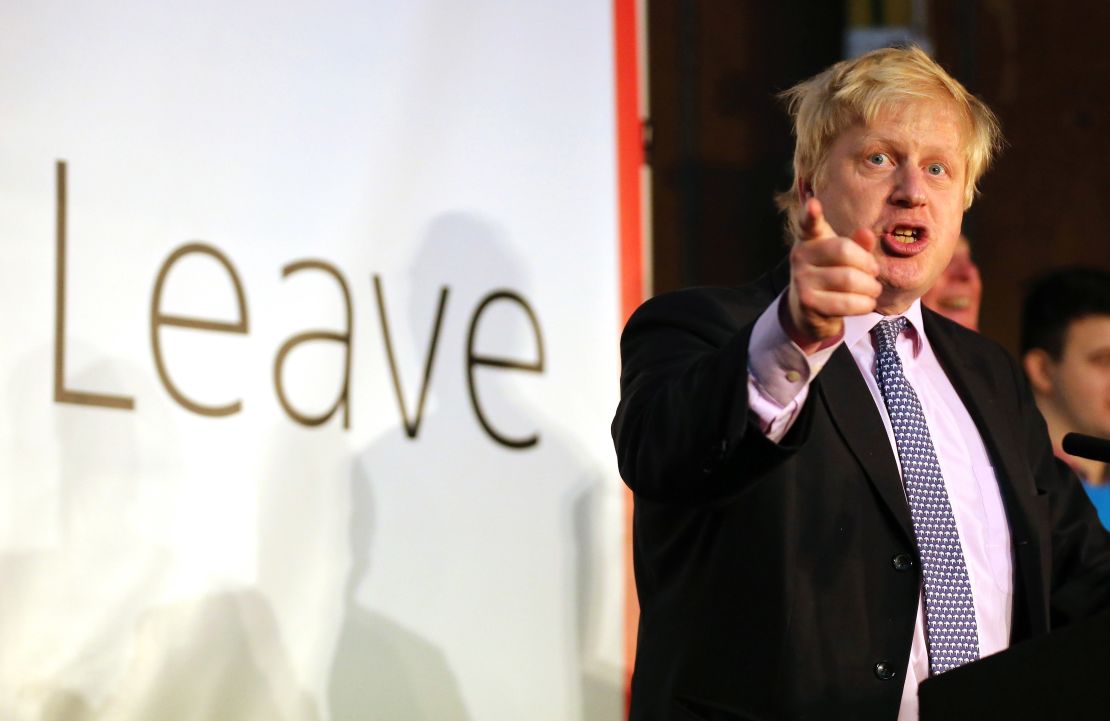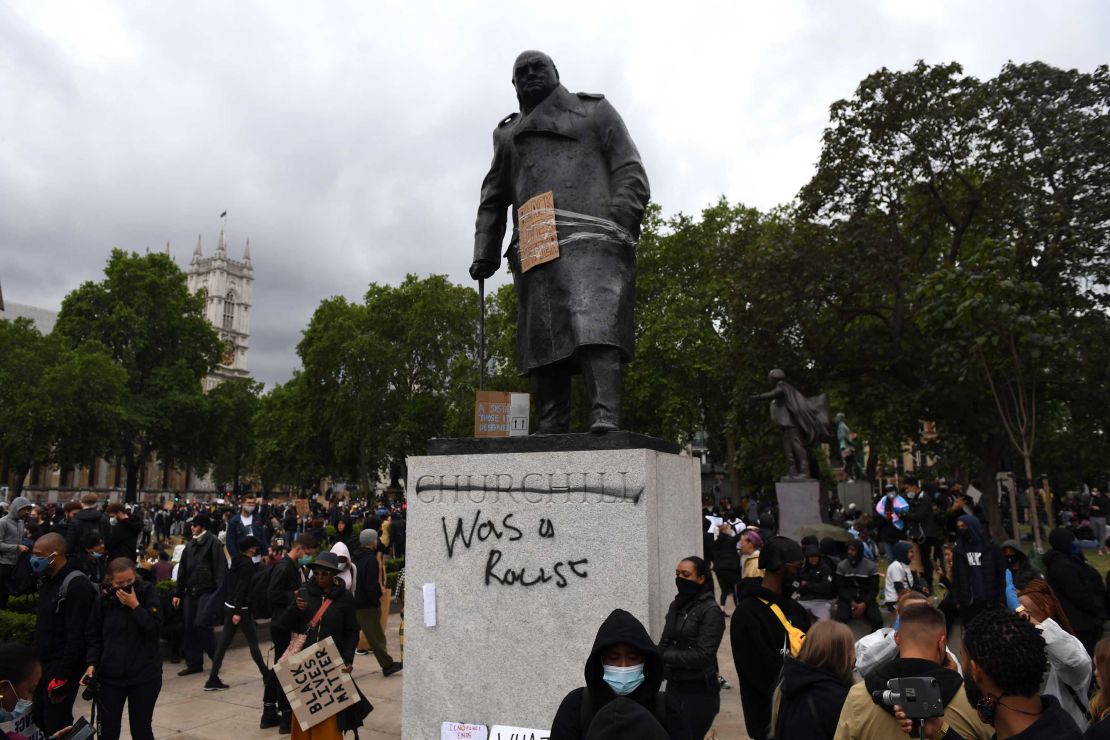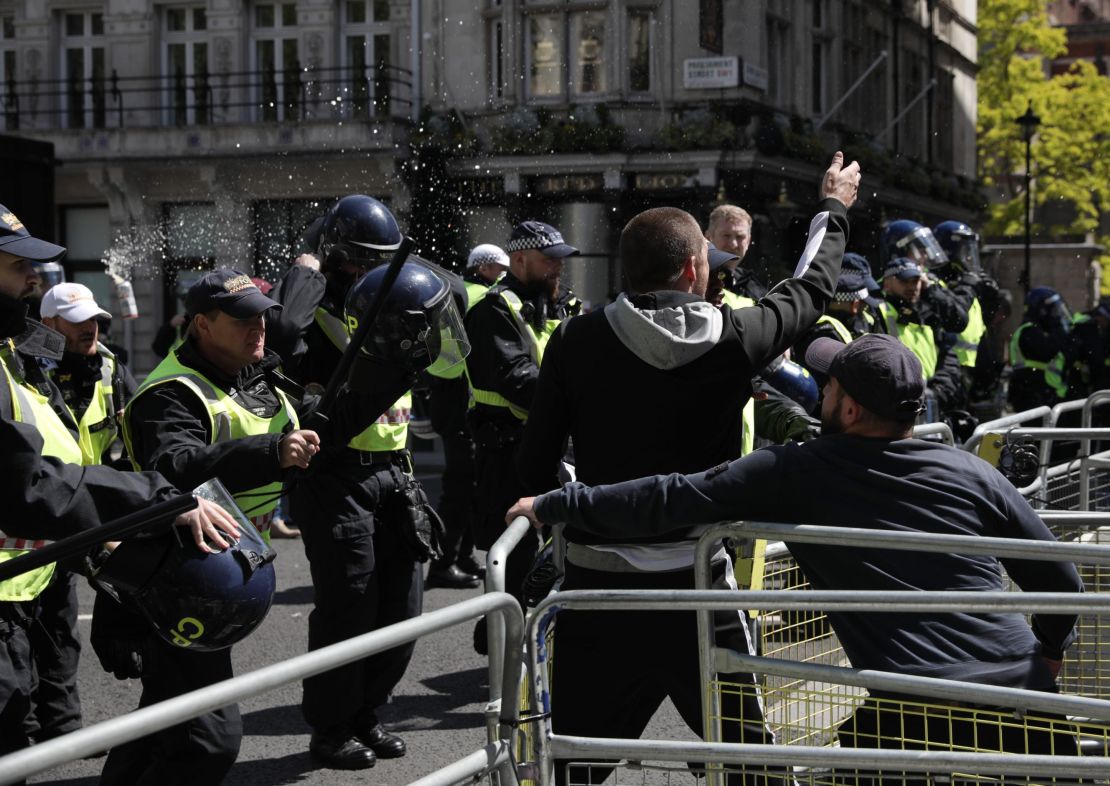Britain is in the middle of a coronavirus disaster. It has one of the highest fatality rates in the world, with at least 52,000 Britons dead from the disease. The UK government’s usual cheerleaders in the right-wing media are eviscerating it on a near-daily basis.
But critics say that instead of tackling the crisis head-on – perhaps with a reshuffle of his ministerial team; a shakeup of government policy; or the announcement of an inquiry – Prime Minister Boris Johnson has engaged in a tactic of an altogether more Trumpian style. He has launched a culture war.
The lead story in Britain’s heavyweight Sunday Times newspaper last weekend was a leak of a plan to block measures that would have made it easier for trans people to change the gender on their birth certificate.
As protests inspired by the Black Lives Matter movement swept across the UK, the Prime Minister condemned the violent removal of a statue of a slave owner, and portrayed the daubing of graffiti on a memorial to Winston Churchill an effort to “photoshop the entire cultural landscape.”
And while his government struggles in the face of the onslaught of Covid-19, Johnson announced the merger of two big government departments – the Foreign and Commonwealth Office (FCO), which oversees the UK government’s foreign policy, and the Department for International Development (DFID), which runs aid policy. The purpose: To fulfil a policy aim favored by the conservative right that foreign aid should be tied to the UK national interest.
Johnson’s government is sitting on a thumping 80-seat majority. It could do anything it wants. Yet experts say the Prime Minister – a former journalist who is an instinctive campaigner – appears to be indulging in what amounts to a re-election effort four years before the date of the next poll. The mystery is – why?
“His reflex is to go back to newspaper commentary and to write columns on statues, to seed stories in the press about trans issues, because that’s a way of mobilizing his own base and to throw a hornet’s nest at his opponents,” Robert Saunders, a British political history expert at Queen Mary University of London, told CNN.
That base is considerably larger than it used to be, and includes many voters in areas that were formerly strongholds of the opposition Labour Party, like the former industrial towns of the English Midlands, Wales and northwest England. Many of those voters were drawn to Johnson by his straightforward electoral promise to “get Brexit done.”

That promise was fulfilled when Britain officially left the European Union at the end of March, and the debate switched from an ideological “in or out” battle to the practicalities of trade and fishing rights. With Brexit largely resolved in the minds of the electorate, the Conservatives might be seeking a new way to “reinforce the impression that the Labour Party only stands for liberal, educated young people, and does not really have a sense of what is going on in middle England,” said Tim Bale, a professor of politics at Queen Mary University of London.
By stoking the divisions that emerged from Brexit, the Prime Minister’s team “are hoping to keep the flame of polarization alive by generating other issues that are likely to trigger the same adversarial feelings,” he added.
The polemicist
Inflaming the opinion of social conservatives is a skill set Johnson nurtured as a journalist. In the 90s, as the Daily Telegraph’s Brussels correspondent, he made a name for himself with bombastic articles that portrayed the EU as a regulatory nightmare, according to British journalist Tom Baldwin in his book “Ctrl Alt. Delete.” From misleading stories about attempts to ban bendy bananas and introduce smaller condoms, Johnson’s coverage, along with that of other rightwing newspapers, contributed to a growing euroskeptic British media environment.
His stint as the pro-immigrant London mayor, between 2008-2016, made him a household name, but he downplayed that social liberalism as he took aim for 10 Downing Street. By the time the 2016 Brexit referendum came around, critics say Johnson’s jingoism was on steroids. The former London mayor, by now a Conservative MP, energetically spearheaded a cynically populist and xenophobic leave campaign.

Targets included the EU, Europeans living in the UK, and even US President Barack Obama – at whom Johnson lashed out for opposing Britain’s exit from the EU. In a column in the Sun newspaper, Johnson suggested that Obama removed a bust of wartime leader Winston Churchill from the Oval Office because of “the part-Kenyan President’s ancestral dislike of the British empire.”
Johnson’s dog-whistling added to the straightforward narrative of an island nation under siege, an effective distraction from more prosaic concerns like access to the single market. “A culture war is fundamentally about distraction,” Saunders added. “You’re trying to distract your opponent from issues that you don’t want to talk about and move them onto issues that you do.”
Pejorative language
Johnson’s campaign, of course, worked. Britain voted narrowly to leave the EU in June 2016. After being voted in last July as new Conservative leader and Prime Minister. His administration, accused of being stacked with yes-men, has however struggled to shake off its campaigning mindset.
Culture war issues are not just an instrumental technique “to shore up the base and expand it,” Bale added. “Some people around Johnson literally believe this stuff and do think traditional British values are under threat from a ‘cancel culture,’ which they think is inimical to the traditions of this country.”
Johnson’s rhetoric has come back to haunt him as Black Lives Matter protests in the UK have turned into a fuller discussion on racial injustice and structural racism in Britain. The Conservative party was in their crosshairs, with critics pointing out Johnson’s habit of using racist language in his past columns, including his 2002 description of “flag-waving piccaninnies,” an offensive term used to describe black children. Johnson apologized for the comments in 2008. In 2018, he compared burqas to “letterboxes,” and the Muslim women who wore them as “bank robbers.”

The Prime Minister has struggled to address the concerns of protesters, flip-flopping between empathy and denial, while refusing to condemn US President Donald Trump for his response to the US protests. After stating “Black Lives Matter” in a statement published in the afro-Caribbean newspaper the Voice, Johnson issued a series of tweets against the removal of statues, saying protests had been hijacked by extremists after a statue of Churchill, of whom Johnson wrote a widely panned biography, was defaced with the words “was a racist.”
He continued to equate the anti-racism protesters with violence, and declaim the sanctity of the now boarded-up Churchill statue, in a Telegraph column on Sunday. He reserved one paragraph to condemn the “patently racist” far-right groups, who clashed with police officers last Saturday as they targeted Black Lives Matter demonstrations.
Johnson announced the launch of a Commission on Race and Ethnic Disparities, which will also examine why white working-class boys fell behind in school. Downing Street policy chief Munira Mirza has reportedly been tasked with helping to set up it up.
But in the last five years, there have been at least four reviews into structural racism in the UK – which have included around 200 recommendations addressing deaths in custody, the criminal justice system, and the Windrush scandal. There’s no need for another inquiry, say campaigners, especially one in which a leading role is played by Mirza, who wrote in a 2017 Spectator article that an “anti-racism lobby” was peddling a “culture of grievance.”
The Prime Minister defended his aide in Parliament on Wednesday, saying he was a huge admirer of Mirza as she is “brilliant thinker about these issues.”
Instead, critics say, the government would do well to enact the recommendations of those previous reviews. “Implement them, that’s what Boris has to do. And then the Black Lives Matter protests can stop and we can get on with dealing with coronavirus,” said the author of one of those reports, opposition Labour MP David Lammy, who used a Financial Times article to accuse Johnson of starting a culture war as a distraction from the government’s handling of racial inequality.
Johnson said the new commission would learn “very fast” what changes needed to be made, according to PA news agency.

Encouraging majoritarian fears
As the last four years have shown, minority groups have been easy targets in populist upheavals. Official statistics from the UK Home Office show that hate crime increased during and immediately after the EU referendum.
Times journalist Rachel Sylvester reported in 2019 “Number 10 has been polling ‘culture war’ issues, such as transgender rights, to see whether they can be weaponized against Labour in northern working-class constituencies.”
That came to fruition last week after J.K. Rowling published a lengthy blog post that linked her opposition to trans women using single-sex spaces to her past experience of domestic abuse. Later, the Sunday Times said the leaked plan included upcoming rules to stop single-sex female spaces like toilets from being used by “those with male anatomy.”
The Minister for Women and Equalities, Liz Truss, told a select committee in April that by the summer she would be putting in place “the protection of single-sex spaces, which is extremely important.” While not commenting or disputing the Sunday Times article, a Number 10 spokesperson said it shared the position of the Government Equalities Office led by Truss.
“Johnson is a pound shop Trump, slightly more acceptable and less utterly crass,” Christine Burns, a trans campaigner and author of “Trans Britain: Our Journey from the Shadows,” told CNN. “Just as Brexit emboldened people to be racist,” to roll back on transgender rights at such a febrile moment “is not just emboldening people to be transphobic in their language, but also to use physical force,” she warned.
The axing of the Department for International Development (DFiD) demonstrated Downing Street’s preference for ideology over capacity, according to David Hudson, Professor of Politics and Development at the University of Birmingham.
“It is somewhat astonishing that it has happened right now in a middle of a pandemic [when] the government and civil service are massively stretched,” Hudson told CNN. The merger, criticized by three former Prime Ministers, would lead to less transparency on how aid is spent and risks diluting DFID’s poverty alleviation agenda, he said.
Johnson defended the move on Tuesday, saying: “for too long, frankly, UK overseas aid has been treated as some giant cashpoint in the sky that arrives without any reference to UK interests or to the values that the UK.”
Johnson has also refused to countenance an extension to the Brexit transition period despite trade policy experts insisting that that Britain needs more time to negotiate a trade deal, especially in a pandemic.
All this is happening as the government is struggling to convince the public that its strategy to handle the coronavirus outbreak has been “world-beating,” according to Johnson – whose pledged track and trace system for June has been beset with problems. The UK’s long-delayed attempt to build a homegrown coronavirus tracing app was abandoned on Thursday in favor of joining efforts led by Apple and Google.
Will Johnson focus on governing rather than rule via press release as Britain’s economy nosedives, the country faces “appalling levels of unemployment, and probably further waves of the pandemic?” Saunders asked.
There are one of two routes the UK could go, he added. The public’s “patience for these stunts might diminish” and Johnson focusses on “talking about jobs, employment, and health policy,” he said. “Or the stunts are going to have to become nastier and more divisive to hold the public’s attention.”








